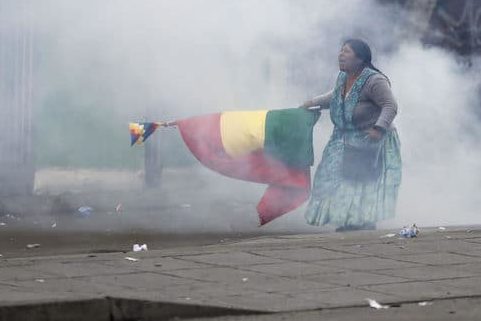by ROXANNE DUNBAR-ORTIZ, ANA MALDONADO, PILAR TROYA FERNANDEZ, & VIJAY PRASHAD

Revolutions do not happen suddenly, nor do they immediately transform a society. A revolution is a process, which moves at different speeds whose tempo can change rapidly if the motor of history is accelerated by intensified class conflict. But, most of the time, the building of the revolutionary momentum is glacial, and the attempt to transform a state and society can be even more slow.
Leon Trotsky, sitting in his Turkish exile in 1930, wrote the most remarkable study of the Russian Revolution. Thirteen years had elapsed since the Tsarist empire had been overthrown. But the revolution was already being derided, even by people on the Left. ‘Capitalism’, Trotsky wrote in the conclusion to that book, ‘required a hundred years to elevate science and technique to the heights and plunge humanity into the hell of war and crisis. To socialism its enemies allow only fifteen years to create and furnish a terrestrial paradise. We took no such obligation upon ourselves. We never set these dates. The process of vast transformation must be measured by an adequate scale’.
When Hugo Chavez won an election in Venezuela (December 1998) and when Evo Morales Ayma won an election in Bolivia (December 2005), their critics on the left in North America and in Europe gave their governments no time to breathe. Some professors with a leftist orientation immediately began to criticise these governments for their limitations, and even their failures. This attitude was limited politically—there was no solidarity given to these experiments; it was also limited intellectually — there was no sense of the deep difficulties for a socialist experiment in Third World countries calcified in social hierarchies and depleted of financial resources.
Pace of Revolution
Two years into the Russian Revolution, Lenin wrote that the newly created USSR is not a ‘miracle-working talisman’, nor does it ‘pave the way to socialism. It gives those who were formerly oppressed the chance to straighten their backs and to an ever-increasing degree to take the whole government of the country, the whole administration of the economy, the whole management of production, into their own hands’.
But even that—that whole this, and whole that—was not going to be easy. It is, Lenin wrote, ‘a long, difficult, and stubborn class struggle, which, after the overthrow of capitalist rule, after the destruction of the bourgeois state…. does not disappear…. but merely changes its forms and in many respects becomes fiercer’. This was Lenin’s judgment after the Tsarist state had been taken over, and after the socialist government had begun to consolidate power. Alexandra Kollantai wrote (such as in Love in the Time of Worker Bees) about the struggles to build socialism, the conflicts within socialism to attain its objectives. Nothing is automatic; everything is a struggle.
Lenin and Kollantai argued that the class struggle is not suspended when a revolutionary government takes over the state; it is in fact, ‘fiercer’, the opposition to it intense because the stakes are high, and the moment dangerous because the opposition—namely the bourgeoisie and the old aristocracy—had imperialism on its side. Winston Churchill said, ‘Bolshevism must be strangled in its cradle’, and so the Western armies joined the White Army in an almost fatal military attack on the Soviet Republic. This attack went from the last days of 1917 to 1923—a full six years of sustained military assault.
Neither in Venezuela nor in Bolivia, nor in any of the countries that turned to the Left over the past twenty years, has the bourgeois state been totally transcended nor has capitalist rule been overthrown.
Monthly Review Online for more
